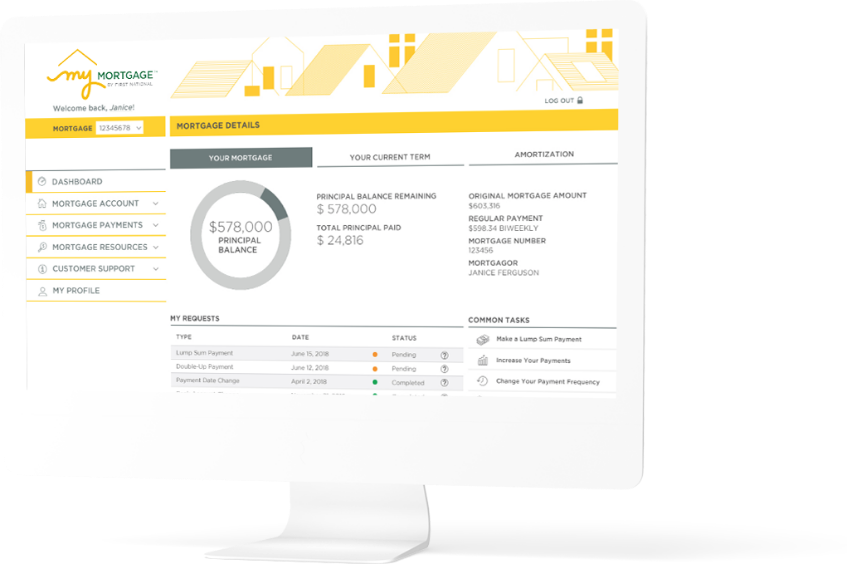Glossary of terms
Your go-to resource for understanding mortgage terms and concepts
The mortgage process introduces terms and concepts that may be unfamiliar to some borrowers. Our mortgage specialists have compiled a comprehensive glossary of terms with explanations to make it easier for you to speak with your broker and choose the right mortgage solution for your needs, lifestyle and budget.
Adjustable rate mortgage
With an adjustable rate mortgage, your interest rate may change from time to time as a result of changes in the First National prime rate. If the interest rate decreases, your payment amount decreases. If the interest rate rises, your payment amount increases.
Amortization
Amortization is the total duration of time that it takes to repay a mortgage in full. The most common amortization is 25 years. Prepayment privileges can help borrowers pay off their mortgages more quickly. Any prepayment option applies directly to the principal balance, enabling interest cost savings.
Sagen
This is a private mortgage default insurance provider.
Canada Mortgage and Housing Corporation (CMHC)
The Corporation of the Federal Government that provides mortgage insurance to lenders against borrower default, under the National Housing Act (NHA).
Closed mortgage
With a closed mortgage, paying your balance before the term’s end can result in prepayment charges. However, closed mortgages often offer prepayment privileges that can include: paying up to 15% of your original principal balance each year, increasing your regular payment by up to 15% or doubling up on payments. Closed mortgage terms can range from six months to 10 years.
Conventional Mortgage
A mortgage with an LTV of 80% or less. Generally, default insurance is not required. However, insurance may be requested if there are other risks associated with the application.
Fixed rate mortgage
With a fixed rate mortgage, your interest rate does not change throughout the mortgage term, enabling you to predict your monthly payments and know how much of your mortgage you will have paid at the end of your term.
Genworth Financial Canada
This is a private mortgage default insurance provider.
Insured Mortgage
A mortgage with borrower paid default insurance. Typically, these loans have a loan to value greater than 80%.
Insurable Mortgage
A mortgage with lender paid default insurance. Insurable mortgages have an LTV of 80% or less but must otherwise meet the same guidelines as an insured mortgage.
Interest
Interest is money paid by a borrower to a lender for the use of the lender's money.
The amount of interest charged by a lender is usually expressed as an annual percentage rate, which is called the mortgage interest rate.
Interest Rate Differential (IRD)
IRD is the difference between your current mortgage interest rate and the current First National interest rate on a replacement mortgage for the time remaining on your term.
Loan to Value (LTV)
A ratio expressed as a percentage of the mortgage loan amount divided by the lesser of the purchase price or the appraised value of the property being mortgaged.
Maturity date
This is the last day of the term of the mortgage agreement. The mortgage agreement must either be renewed prior to the Maturity Date or the mortgage balance paid in full prior to the Maturity Date.
Mortgagee
The lender of a mortgage is called the mortgagee.
Mortgagor
The borrower of a mortgage is called the mortgagor.
Mortgage insurance
This insurance is very different from mortgage life insurance or property, fire and casualty insurance; mortgage insurance provides protection to the lender only in the event of a default by the borrower.
Open mortgage
An open mortgage allows you to make additional payments or pay off your mortgage without penalties. Interest rates are typically higher for this privilege.
Term
Term refers to the duration of a mortgage agreement, which can run anywhere from six months to five years or more. After the initial mortgage term expires, renewal and refinancing options may be available to you at the current posted interest rate at the time.
Generally speaking, borrowers choose shorter-term mortgages if they need more flexibility or anticipate making changes in the near term. Longer-term mortgages enable borrowers that don’t foresee changes on the horizon to take advantage of favourable rates for a longer period of time.
Additional resources
The Financial Consumer Agency of Canada (FCAC) provides general information about mortgages on its website.

Easy, convenient mortgage management.
Track your mortgage details, review your mortgage account, manage your mortgage payments, update your mortgage account information and more – online, anywhere, at any time.


